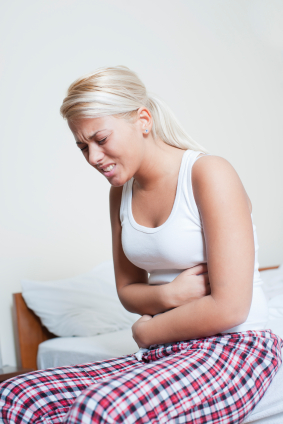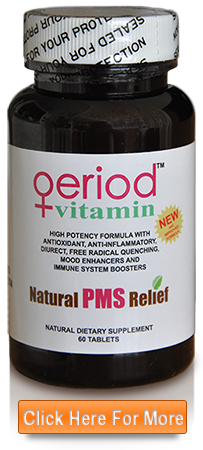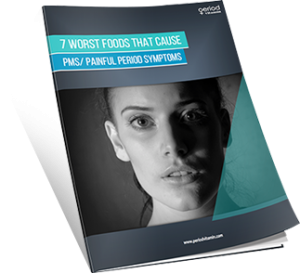Your age doesn’t determine how well you handle your periods. Your health does. So if you’re asking the question, are painful periods normal, the answer is no.
The truth is that many women have painful periods – nausea and diarrhea, gas, swollen stomach, cramping, bloatedness, nipples and breast tenderness, headaches, and water retention, but this doesn’t mean that it is normal. These symptoms are a sign that something in your body is out of kilter – and it’s a clue to you to start searching for what causes are behind them.
 Here are some of the causes of period pains, which can include pains from heavy bleeding and bloating:
Here are some of the causes of period pains, which can include pains from heavy bleeding and bloating:
1. Birth control pills – By taking higher amounts of estrogen than what your body actually needs, your body has to then detoxify the excess estrogen. This can strain your liver, which is your body’s main detoxification organ.
2. Constipation – Extra waste sitting around in the large intestine is a stress on your body because it’s a burden for your detoxification organs. All the energy that would be used to prevent you from having painful periods is wasted on dealing with constipation instead.
3. Obesity – Extra fat you have in your body causes inflammation. Inflammation then contributes to making pain worse, no matter what type of pain you have. Thus, if you have tried home remedies and even received treatment for painful periods without success, it’s time to deal with the obesity.
4. Vitamin and mineral deficiencies – Menstrual cycle abnormalities are common when you have vitamin and mineral deficiencies. You may want to see a clinical nutritionist to determine what vitamins and minerals to take. It’s the best way – and eliminates any guesswork.
5 Natural Remedies for Painful Periods and PMS
Instead of asking the question, why do I keep getting painful periods, try these five natural remedies, which have worked for many women for PMS in the past.
1. Herbs – If you have cramps, the herbs to take would be ones that are anti-spasmodic, such as ginger tea, fennel tea, and peppermint tea. These three herbs are easily found at your health food store and also many grocery stores with a health food section. You can drink these cups of tea all day long if necessary; they are not toxic in any way.
2. Exercise – Many women swear that yoga offers them PMS and painful periods relief. Others say that once they started working out with weights and doing cardio, their PMS issues were eliminated. Try it and find out how well it works for you.
3. Healthy Diet – How healthy is your diet? If you’re still eating sugary foods, potato chips, and processed foods, this is contributing to your painful periods. These foods cause inflammation in the body; they rob your body of nutrients and create deficiencies; and offer your body absolutely no life force whatsoever. If all you did was take 6 weeks to start changing your diet to a healthy one
4. Juice Fasting – Juice fasting is a good way to drastically increase your nutrient intake. Think about it – one cup of carrot juice has all the nutrients of a whole pound of carrots, much more than what you would normally consume. If you drink 16 ounces of juices each day of your period composed of 1 pound of carrots, ¼ pound of spinach, ¼ pound of kale, 1 apple, ½ stalk of celery, you’re taking in more vegetables than many people get in a full week. There’s a lot of absorbable calcium, magnesium, vitamins and other minerals – all which are going to help you prevent PMS disturbances.
 5. Vitamins and Minerals – Using vitamins and minerals is definitely a way to make PMS less painful. But which ones do you take? Do you sit at home reading the internet, only focusing on a few of the nutrients or do you take multi vitamins?
5. Vitamins and Minerals – Using vitamins and minerals is definitely a way to make PMS less painful. But which ones do you take? Do you sit at home reading the internet, only focusing on a few of the nutrients or do you take multi vitamins?
There’s a big potential problem that results if you only focus on a few of the vitamins and minerals. All vitamins and minerals work together. For example, vitamin A works with vitamin E and vitamin C. If you only take vitamin C without vitamin A and vitamin E, then you will end up eventually with a vitamin A and vitamin E deficiency.
Nutrition isn’t a topic that lends itself to how-to doctoring. However, if you take a multi-vitamin called a period vitamin, you have a better chance of improving your nutrition, and indirectly, your period pains. A period vitamin is a combination of necessary vitamins, minerals and herbs that have been found to be specifically helpful for support of the woman’s body during her menstrual years.
For example, a woman who is menstruating has higher needs for iron than a woman who does not have her periods. Some of the ingredients in the period vitamin include vitamin A, B complex, vitamin C, vitamin D, vitamin E, vitamin K, calcium, magnesium, zinc, copper, selenium, phosphorus, and boron, as well as herbs specifically for menstruating women.
Taking a period vitamin is one of the easiest ways to manage menstrual difficulties. Try it and find out how well it works for you.


